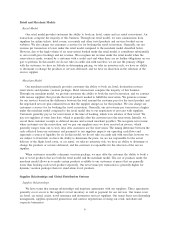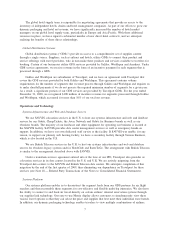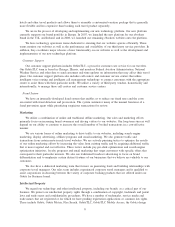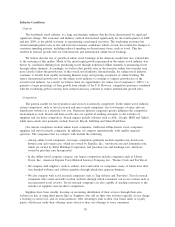Orbitz 2009 Annual Report Download - page 16
Download and view the complete annual report
Please find page 16 of the 2009 Orbitz annual report below. You can navigate through the pages in the report by either clicking on the pages listed below, or by using the keyword search tool below to find specific information within the annual report.revolving credit facility. If letters of credit were issued under our revolving credit facility, our ability to borrow
amounts to fund our working capital and other needs could be severely limited.
Certain of our international subsidiaries have a history of significant operating losses, and our inability to
improve their scale and profitability could adversely affect our business and results of operations.
We have historically incurred significant operating losses at our European subsidiaries and may continue
to experience operating losses in the future, particularly since we expect to continue to incur significant
marketing and other expenses in order to grow our international business. As a result, we have made, and may
continue to make, significant investments in their operations by using a portion of the cash flow generated
from our domestic operations or making additional borrowings under our revolving credit facility. There can
be no assurance that our European subsidiaries will be profitable in the future or that any profits generated by
them will be sufficient to recover our investment in them.
The profitability of our European business depends to a large extent on the scale of its operation. If we
fail to achieve the desired scale, we may not be able to effectively compete in the European marketplace and
our business and results of operations may be adversely affected.
Our international operations are subject to additional risks not encountered when doing business in the
U.S., including foreign exchange risk, and our exposure to these risks will increase as we expand our
international operations.
Our international operations involve risks that may not exist when doing business in the U.S. With
employees in approximately 20 countries outside the U.S., we generated 21% of our net revenue for the year
ended December 31, 2008 from our international operations. In order to achieve widespread acceptance in
each country we enter, we must tailor our services to the unique customs and cultures of that country.
Learning the customs and cultures of various countries, particularly with respect to travel patterns and
practices, is a difficult task and our failure to do so could slow our growth in international markets.
In addition, we are subject to certain risks as a result of having international operations and from having
operations in multiple countries generally, including:
• difficulties in staffing and managing operations due to distance, time zones, language and cultural
differences, including issues associated with establishing management systems infrastructure in various
countries;
• differences and unexpected changes in regulatory requirements and exposure to local economic
conditions;
• increased risk of piracy and limits on our ability to enforce our intellectual property rights;
• preference of local populations for local providers;
• restrictions on the repatriation of non-U.S. investments and earnings back to the U.S., including
withholding taxes imposed by certain foreign jurisdictions;
• diminished ability to legally enforce our contractual rights; and
• currency exchange rate fluctuations.
To the extent we are not able to effectively mitigate or eliminate these risks, our results of operations
could be adversely affected.
Further, our international operations require us to comply with a number of U.S. and international
regulations. For example, we must comply with the Foreign Corrupt Practices Act, or FCPA, which prohibits
U.S. companies or their agents and employees from providing anything of value to a foreign official for the
purposes of influencing any act or decision of these individuals in their official capacity to help obtain or
retain business, direct business to any person or corporate entity or obtain any unfair advantage. Any failure
by us to adopt appropriate compliance procedures and ensure that our employees and agents comply with the
16
























